python代码实现RNN, LSTM, GRU
- 安装torch, transformers, loguru(本代码实现为下方版本,其余版本实现可比葫芦画瓢自行摸索)
pip install torch==1.13.1 transformers==4.44.1 numpy==1.26.4 loguru -i https://pypi.tuna.tsinghua.edu.cn/simple/
- RNN:Recurrent Neural Network,网络结构如下图所示:
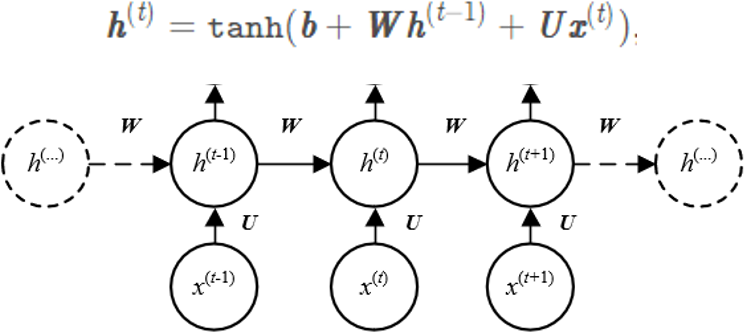
import numpy as np
import torch
import torch.nn as nn
from loguru import logger
class RNNNet(nn.Module):
def __init__(self, input_size, output_size):
super(RNNNet, self).__init__()
self.rnn = nn.RNN(input_size, output_size, batch_first=True)
def forward(self, x):
return self.rnn(x)
class DiyRnn:
def __init__(self, input_size, output_size, w_ih, w_hh, b_ih, b_hh):
self.input_size = input_size
self.output_size = output_size
self.w_ih = w_ih
self.w_hh = w_hh
self.b_ih = b_ih
self.b_hh = b_hh
def forward(self, x):
h = np.zeros(self.output_size)
output = []
for x_t in x:
wh = np.dot(self.w_hh, h)+self.b_hh
ux = np.dot(self.w_ih, x_t)+self.b_ih
h = np.tanh(wh + ux)
output.append(h)
return output, h
if __name__ == '__main__':
np.random.seed(0)
x = np.random.rand(2, 3)
logger.info(x)
# [[0.5488135 0.71518937 0.60276338]
# [0.54488318 0.4236548 0.64589411]]
output_size = 4
rnn_net = RNNNet(input_size=x.shape[-1], output_size=output_size)
config = rnn_net.state_dict()
logger.info(config)
# OrderedDict([('rnn.weight_ih_l0', tensor([[-0.0457, -0.4071, 0.2976],
# [-0.0054, -0.0933, 0.0067],
# [0.3260, 0.2038, 0.2182],
# [0.4280, -0.4157, 0.2622]])),
# ('rnn.weight_hh_l0', tensor([[-0.2899, 0.4229, 0.4570, 0.0994],
# [-0.2007, -0.0576, -0.3966, -0.2938],
# [0.4743, -0.1752, -0.1097, -0.3806],
# [0.4464, 0.0088, 0.0849, -0.2520]])),
# ('rnn.bias_ih_l0', tensor([0.0525, -0.2808, 0.0765, -0.4127])),
# ('rnn.bias_hh_l0', tensor([0.0074, -0.1029, -0.2717, 0.3444]))])
# 拿出相关权重
w_ih = config['rnn.weight_ih_l0'].numpy()
w_hh = config['rnn.weight_hh_l0'].numpy()
b_ih = config['rnn.bias_ih_l0'].numpy()
b_hh = config['rnn.bias_hh_l0'].numpy()
diy_rnn = DiyRnn(input_size=x.shape[-1], output_size=output_size, w_ih=w_ih, w_hh=w_hh, b_ih=b_ih, b_hh=b_hh)
logger.info(rnn_net.forward(torch.FloatTensor([x])))
# (tensor([[[-0.0768, -0.4213, 0.2552, 0.0274],
# [0.0182, -0.4553, 0.2057, 0.1342]]], grad_fn= < TransposeBackward1 >), tensor(
# [[[0.0182, -0.4553, 0.2057, 0.1342]]], grad_fn= < StackBackward0 >))
logger.info(diy_rnn.forward(x))
# ([array([-0.07679531, -0.42131666, 0.25521276, 0.02736465]),
# array([0.01821601, -0.45531428, 0.20569796, 0.13417281])],
# array([0.01821601, -0.45531428, 0.20569796, 0.13417281]))
-
LSTM: LONG SHORT-TERM MEMORY
-
LSTM参考:
LONG SHORT-TERM MEMORY

- 如图,相较于RNN,LSTM引入了三个门(forget:遗忘门; input:输入门; output:输出门)以及一个cell(细胞状态)
- 遗忘门
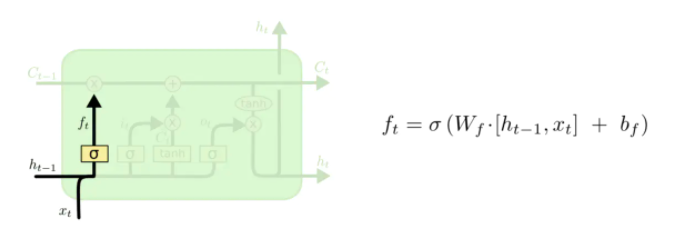
- 输入门

- 细胞状态
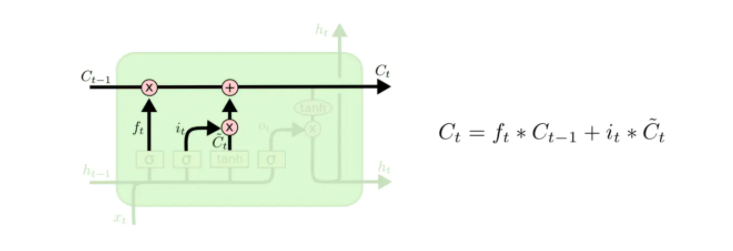
- 输出门

- 如下所示(来自pytorch官方文档), pytorch将四个门的权重拼接存储, 使用时应将权重拆分
pytorch-LSTM

import numpy as np
import torch
import torch.nn as nn
from loguru import logger
class LSTMNet(nn.Module):
def __init__(self, input_size, output_size):
super(LSTMNet, self).__init__()
self.lstm = nn.LSTM(input_size, output_size, batch_first=True)
def forward(self, x):
return self.lstm(x)
def sigmoid(x):
return 1 / (1 + np.exp(-x))
class DiyLSTM:
def __init__(self, input_size, output_size, params):
self.input_size = input_size
self.output_size = output_size
self.params = params
def forward(self, x):
c_state = np.zeros((1, self.output_size))
h_t = np.zeros((1, self.output_size))
output = []
for x_t in x:
# 拼接h_t-1和x_t
x_t = x_t[np.newaxis, :]
hx = np.concatenate([h_t, x_t], axis=1)
# 遗忘门
f_gate = sigmoid(np.dot(hx, self.params['w_f'].T) + self.params['b_f'])
# 输入门
i_gate = sigmoid(np.dot(hx, self.params['w_i'].T) + self.params['b_i'])
c_t = np.tanh(np.dot(hx, self.params['w_g'].T) + self.params['b_g'])
# 细胞状态
c_state = f_gate * c_state + i_gate * c_t
# 输出门
o_gate = sigmoid(np.dot(hx, self.params['w_o'].T) + self.params['b_o'])
h_t = o_gate * np.tanh(c_state)
output.append(h_t)
return output, (h_t, c_state)
if __name__ == '__main__':
np.random.seed(0)
x = np.random.rand(2, 3)
logger.info(x)
# [[0.5488135 0.71518937 0.60276338]
# [0.54488318 0.4236548 0.64589411]]
output_size = 4
lstm_net = LSTMNet(input_size=x.shape[-1], output_size=output_size)
config = lstm_net.state_dict()
logger.info(config)
# OrderedDict([('lstm.weight_ih_l0', tensor([[-4.9427e-01, 1.9967e-01, -2.3552e-01],
# [-3.9925e-01, -4.3527e-01, -4.3788e-01],
# [2.3260e-01, -3.4320e-01, -1.9645e-01],
# [4.6990e-02, -1.0843e-01, -3.7759e-01],
# [-4.7427e-01, 1.4113e-01, 9.9269e-02],
# [-1.1028e-01, -2.8063e-02, -1.9031e-01],
# [4.0165e-02, 3.4149e-01, -4.2790e-01],
# [8.7034e-02, 2.1281e-01, 1.7534e-02],
# [-1.1237e-01, 3.0430e-01, -1.5539e-01],
# [-1.9999e-01, 3.9918e-01, 3.5223e-01],
# [3.9140e-01, -4.7726e-01, 3.8438e-02],
# [-4.8784e-01, -4.0153e-01, -1.4178e-01],
# [-4.8935e-01, 5.2839e-02, -2.2023e-01],
# [4.2617e-04, 1.0101e-01, -1.0125e-01],
# [3.0032e-01, -4.1422e-01, -1.5690e-02],
# [-2.1115e-01, 4.1811e-01, 1.2737e-01]])),
# ('lstm.weight_hh_l0', tensor([[-0.0955, 0.1711, 0.0808, -0.3968],
# [0.4032, 0.0011, -0.3469, 0.2721],
# [0.3867, 0.3623, 0.4939, -0.3715],
# [0.3079, 0.3738, -0.2541, -0.0634],
# [0.4938, -0.3674, -0.4637, -0.3214],
# [0.0966, 0.2149, 0.0437, -0.0785],
# [-0.2184, 0.2239, -0.1109, -0.1011],
# [0.2706, -0.0714, 0.0262, -0.3305],
# [-0.0541, -0.0007, -0.3030, 0.1019],
# [-0.1091, -0.0877, 0.2487, -0.3302],
# [-0.1562, 0.2569, 0.4448, 0.4016],
# [0.2281, 0.4276, 0.0385, -0.2319],
# [-0.1003, -0.2430, 0.3855, 0.0251],
# [0.4021, 0.3176, 0.3161, -0.4141],
# [-0.0311, -0.1515, -0.1146, -0.0086],
# [-0.4698, -0.0452, 0.1368, -0.3899]])),
# ('lstm.bias_ih_l0', tensor([0.0064, 0.4618, -0.3796, -0.0715, -0.1619, -0.3431, -0.0426, 0.3353,
# 0.3295, -0.2912, -0.2534, 0.0718, 0.4179, 0.0605, -0.2152, -0.0713])),
# ('lstm.bias_hh_l0', tensor([0.2422, -0.4391, -0.4711, -0.0895, -0.2479, -0.4610, -0.4583, -0.4978,
# 0.0348, 0.4443, 0.2497, 0.2130, 0.1853, -0.0892, -0.0290, -0.2548]))])
# 拿出相关权重
w_ih = config['lstm.weight_ih_l0'].numpy()
w_hh = config['lstm.weight_hh_l0'].numpy()
b_ih = config['lstm.bias_ih_l0'].numpy()
b_hh = config['lstm.bias_hh_l0'].numpy()
params = {}
# 进行拆分
w_ii = w_ih[0:output_size, :]
w_if = w_ih[output_size:output_size * 2, :]
w_ig = w_ih[output_size * 2:output_size * 3, :]
w_io = w_ih[output_size * 3:output_size * 4, :]
w_hi = w_hh[0:output_size, :]
w_hf = w_hh[output_size:output_size * 2, :]
w_hg = w_hh[output_size * 2:output_size * 3, :]
w_ho = w_hh[output_size * 3:output_size * 4, :]
b_ii = b_ih[0:output_size]
b_if = b_ih[output_size:output_size * 2]
b_ig = b_ih[output_size * 2:output_size * 3]
b_io = b_ih[output_size * 3:output_size * 4]
b_hi = b_hh[0:output_size]
b_hf = b_hh[output_size:output_size * 2]
b_hg = b_hh[output_size * 2:output_size * 3]
b_ho = b_hh[output_size * 3:output_size * 4]
# 再拼接
params['w_i'] = np.concatenate((w_hi, w_ii,), axis=1)
params['w_f'] = np.concatenate((w_hf, w_if), axis=1)
params['w_g'] = np.concatenate((w_hg, w_ig), axis=1)
params['w_o'] = np.concatenate((w_ho, w_io), axis=1)
params['b_i'] = b_hi + b_ii
params['b_f'] = b_hf + b_if
params['b_g'] = b_hg + b_ig
params['b_o'] = b_ho + b_io
# 验证
output, (h_t, c_state) = lstm_net.forward(torch.Tensor([x]))
diy_lstm = DiyLSTM(input_size=x.shape[-1], output_size=output_size, params=params)
diy_output, (diy_h_t, diy_c_state) = diy_lstm.forward(x)
logger.info(output)
# tensor([[[0.1099, 0.0768, -0.0109, -0.0642],
# [0.1214, 0.0942, -0.0036, -0.0610]]], grad_fn= < TransposeBackward0 >)
# logger.info(diy_output)
# [array([[0.10993756, 0.07675594, -0.01088845, -0.06423639]]),
# array([[0.12144392, 0.09417902, -0.00356926, -0.06100272]])]
logger.info('-'*30)
logger.info(h_t)
# tensor([[[0.1214, 0.0942, -0.0036, -0.0610]]], grad_fn= < StackBackward0 >)
logger.info(diy_h_t)
# [[0.12144392 0.09417902 - 0.00356926 - 0.06100272]]
logger.info('-' * 30)
logger.info(c_state)
# tensor([[[0.2266, 0.1867, -0.0083, -0.1374]]], grad_fn= < StackBackward0 >)
logger.info(diy_c_state)
# [[0.22656548 0.18674521 - 0.00828899 - 0.13736903]]
- GRU: Gated Recurrent Unit
- GRU参考:
Empirical Evaluation of Gated Recurrent Neural Networks on Sequence Modeling
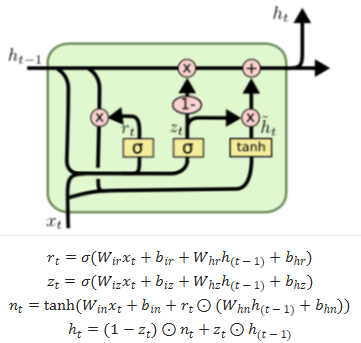
- 如图,相较于LSTM, GRU就只有重置门(reset gate)和更新门(update gate)。
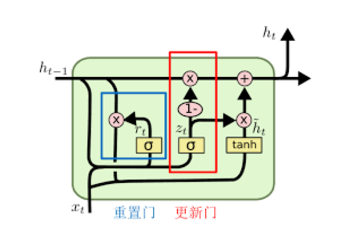
- 同LSTM, pytorch将GRU三个权重拼接存储,使用时应将权重拆分
pytorch-GRU

import numpy as np
import torch
import torch.nn as nn
from loguru import logger
class GRUNet(nn.Module):
def __init__(self, input_size, output_size):
super(GRUNet, self).__init__()
self.gru = nn.GRU(input_size, output_size, batch_first=True)
def forward(self, x):
return self.gru(x)
def sigmoid(x):
return 1/(1 + np.exp(-x))
class DiyGRU:
def __init__(self, input_size, output_size, params):
self.params = params
self.input_size = input_size
self.output_size = output_size
def forward(self, x):
h_t = np.zeros((1, self.output_size))
output = []
for x_t in x:
# 拼接h_t-1和x_t
x_t = x_t[np.newaxis, :]
hx = np.concatenate([h_t, x_t], axis=1)
# 重置门
z_gate = sigmoid(np.dot(hx, self.params['w_z'].T)+self.params['b_z'])
# 更新门
r_gate = sigmoid(np.dot(hx, self.params['w_r'].T)+self.params['b_r'])
h = np.tanh(r_gate * (np.dot(h_t, self.params['w_hn'].T)+self.params['b_hn']) + np.dot(x_t, params['w_in'].T)+self.params['b_in'])
h_t = (1 - z_gate) *h + z_gate * h_t
output.append(h_t)
return output, h_t
if __name__ == '__main__':
np.random.seed(0)
x = np.random.rand(2, 3)
logger.info(x)
# [[0.5488135 0.71518937 0.60276338]
# [0.54488318 0.4236548 0.64589411]]
output_size = 4
gru_net = GRUNet(input_size=x.shape[-1], output_size=output_size)
config = gru_net.state_dict()
logger.info(config)
# OrderedDict([('gru.weight_ih_l0', tensor([[0.3498, -0.2464, 0.1821],
# [0.4983, 0.2338, 0.2775],
# [0.3149, -0.1604, -0.3139],
# [0.1033, -0.4810, 0.2286],
# [0.4119, -0.0904, 0.0235],
# [-0.2726, -0.1599, -0.1409],
# [0.4868, 0.3642, -0.4094],
# [0.3575, 0.3485, -0.0588],
# [-0.4573, -0.1335, 0.2341],
# [-0.3783, 0.4000, -0.4123],
# [0.3719, -0.2910, -0.0990],
# [0.4505, 0.2768, -0.4415]])),
# ('gru.weight_hh_l0', tensor([[-0.3311, -0.4529, 0.2700, 0.0751],
# [0.3137, -0.1595, -0.2992, -0.0155],
# [-0.1653, -0.2416, -0.0491, 0.2202],
# [0.0444, -0.2747, 0.3629, 0.3710],
# [-0.1979, -0.3254, -0.2218, 0.4253],
# [-0.0551, 0.3831, 0.4546, -0.2381],
# [0.0586, 0.1298, 0.4931, 0.3256],
# [0.3766, -0.4562, -0.3886, -0.0262],
# [0.1932, 0.3176, -0.2126, 0.4094],
# [-0.2687, -0.1186, -0.2640, 0.0742],
# [0.4005, -0.4942, 0.0684, 0.4556],
# [-0.2354, 0.4706, -0.0453, -0.3255]])),
# ('gru.bias_ih_l0', tensor([0.2916, 0.3510, -0.3568, 0.2643, 0.2218, -0.2269, 0.4010, 0.4272,
# 0.1880, 0.1084, 0.4999, -0.2438])),
# ('gru.bias_hh_l0', tensor([0.4873, 0.1265, -0.4216, 0.3730, -0.1611, 0.4775, -0.1161, -0.4087,
# -0.2695, -0.2110, -0.0021, 0.3299]))])
# 拿出相关权重
w_ih = config['gru.weight_ih_l0'].numpy()
w_hh = config['gru.weight_hh_l0'].numpy()
b_ih = config['gru.bias_ih_l0'].numpy()
b_hh = config['gru.bias_hh_l0'].numpy()
params = {}
# 进行拆分
w_ir = w_ih[0:output_size, :]
w_iz = w_ih[output_size:output_size * 2, :]
w_in = w_ih[output_size * 2:output_size * 3, :]
w_hr = w_hh[0:output_size, :]
w_hz = w_hh[output_size:output_size * 2, :]
w_hn = w_hh[output_size * 2:output_size * 3, :]
b_ir = b_ih[0:output_size]
b_iz = b_ih[output_size:output_size * 2]
b_in = b_ih[output_size * 2:output_size * 3]
b_hr = b_hh[0:output_size]
b_hz = b_hh[output_size:output_size * 2]
b_hn = b_hh[output_size * 2:output_size * 3]
# 再拼接
params['w_r'] = np.concatenate((w_hr, w_ir), axis=1)
params['w_z'] = np.concatenate((w_hz, w_iz), axis=1)
params['b_r'] = b_hr + b_ir
params['b_z'] = b_hz + b_iz
params['w_in'] = w_in
params['w_hn'] = w_hn
params['b_in'] = b_in
params['b_hn'] = b_hn
# 验证
output, h_t = gru_net.forward(torch.Tensor([x]))
diy_gru = DiyGRU(input_size=x.shape[-1], output_size=output_size, params=params)
diy_output, diy_h_t = diy_gru.forward(x)
logger.info(output)
# tensor([[[-0.0910, -0.1133, 0.1485, 0.0547],
# [-0.1427, -0.2251, 0.2752, 0.0393]]], grad_fn= < TransposeBackward1 >)
logger.info(diy_output)
# [array([[-0.09097601, -0.11329616, 0.14852062, 0.05474681]]),
# array([[-0.14269054, -0.22514825, 0.27520506, 0.03929618]])]
logger.info('-'*50)
logger.info(h_t)
# tensor([[[-0.1427, -0.2251, 0.2752, 0.0393]]], grad_fn= < StackBackward0 >)
logger.info(diy_h_t)
# [[-0.14269054 - 0.22514825 0.27520506 0.03929618]]



